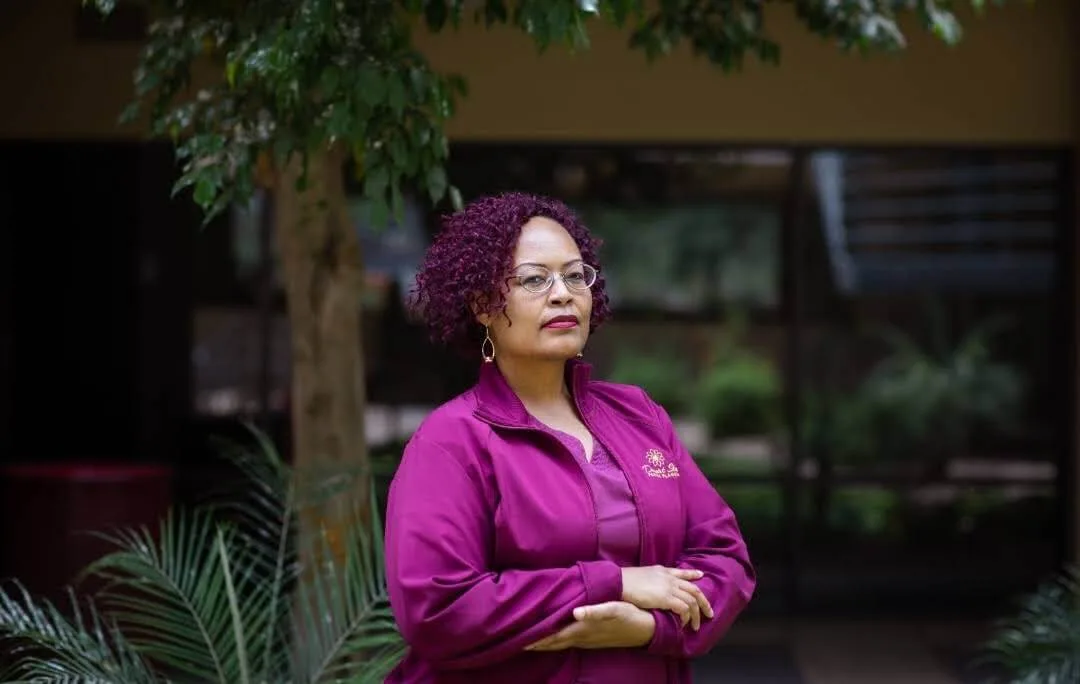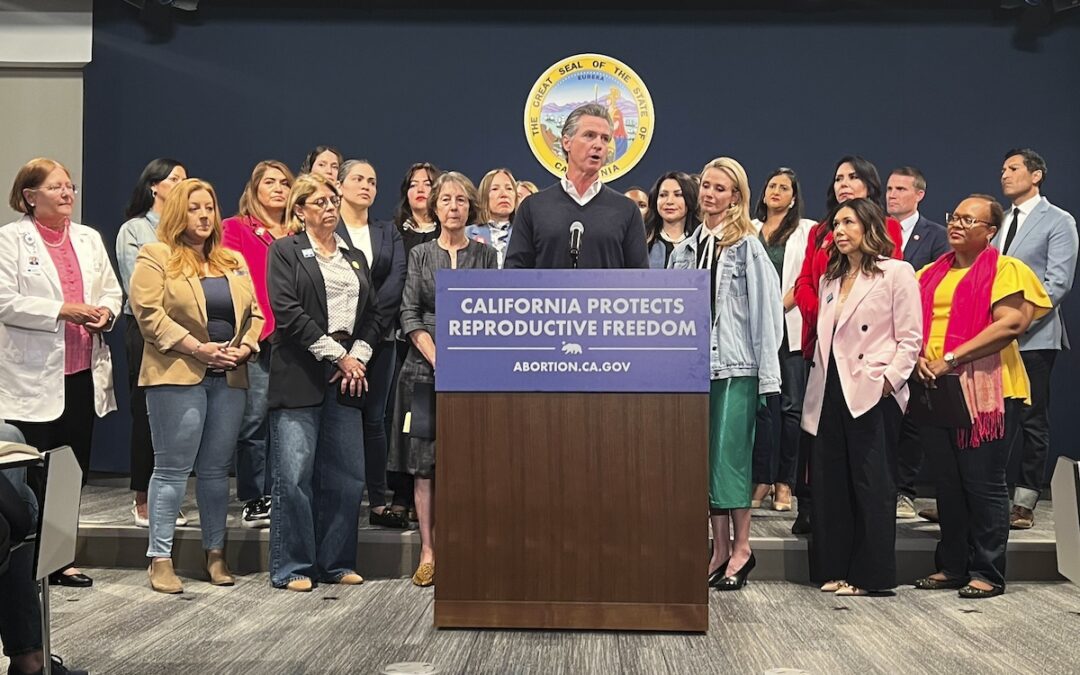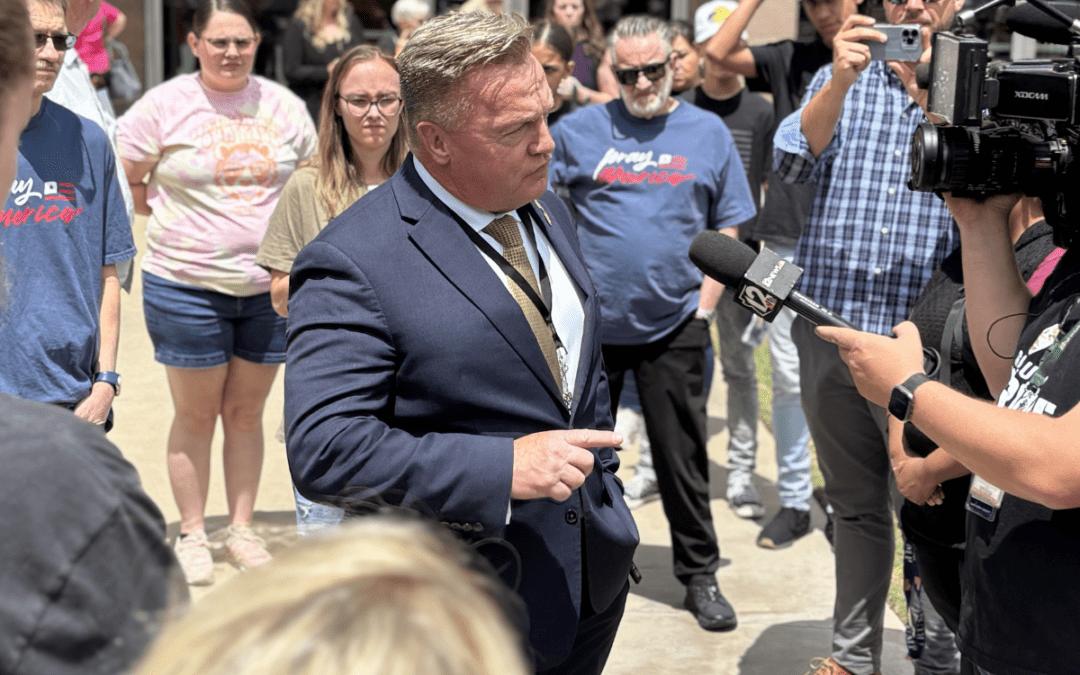
Dr. DeShawn Taylor is an OB-GYN and owner of Desert Star Family Planning, an abortion clinic in Arizona. (Photo courtesy of Dr. DeShawn Taylor)
Arizona’s Supreme Court will soon decide whether to roll the state back to an 1864 abortion law—from when Arizona was still a US Territory.
What do you do when your state has two conflicting laws on the books—and performing your job could violate one of them?
“I know my clinic, Desert Star, did not provide care for about three weeks after the Dobbs decision,” said Dr. DeShawn Taylor, OB-GYN and owner of Desert Star Institute for Family Planning, an abortion provider in Phoenix.
“We weren’t getting accurate information from our elected officials unfortunately during that time, and so we had to go through legal counsel, both civil and criminal, to just figure things out.”
Today in Arizona, abortion is limited, but legal within the first 15 weeks of pregnancy. But in the days and weeks following the US Supreme Court’s June 2022 decision on the Dobbs v. Jackson case—which resulted in a reversal of Roe v. Wade—the fate of Arizona’s handful of abortion clinics was uncertain.
“Most abortion providers in Arizona paused right after the [Dobbs] decision as we were waiting for things to be sorted out,” Taylor said.
Now, another court decision has Arizonans facing abortion uncertainty again. The state’s Supreme Court is set to review a case in December that could take Arizona back to an abortion law from 1864—when Arizona was still just a US territory.
A quick timeline
While there have been more rulings on abortion in Arizona than those below, here are the rulings to know as you’re following the latest news.
1864: The Territory of Arizona bans abortion, with an exception for the life of the mother:
“[E]very person who shall administer or cause to be administered or taken, any medicinal substances, or shall use or cause to be used any instruments whatever, with the intention to procure the miscarriage of any woman then being with child, and shall be thereof duly convicted, shall be punished by imprisonment in the Territorial prison for a term not less than two years nor more than five years: Provided, that no physician shall be affected by the last clause of this section, who in the discharge of his professional duties, deems it necessary to produce the miscarriage of any woman in order to save her life.”
1973: The US Supreme Court decides the Roe v. Wade case, saying that the right to liberty in the US Constitution protected the right of an individual to make a decision to have an abortion, and that it did not fall within the government’s rights to make such a decision on behalf of individuals. Roe also required state governments to justify interfering with the Court’s decision by passing laws contradicting Roe. In particular, state governments were not to interfere with the right to an abortion before “fetal viability”—the point at which a fetus could survive outside a uterus—or one that would protect a pregnant person’s life.
1973: The Arizona Court of Appeals issues an injunction against the 1864 ban, citing Roe as a basis for its decision. This injunction effectively made the 1864 law powerless—however, it did not strike the law from the records.
1973-2022: A number of Arizona laws and court cases place variations of limits on abortion in the state.
March 2022: Then-Gov. Doug Ducey signs a law banning abortion after 15 weeks of pregnancy, with exceptions for the life of the mother, to go into effect in late September 2022.
June 2022: The US Supreme Court reverses the Roe v. Wade decision through the Dobbs v. Jackson case. All states revert back to the most recent law on their books outside of Roe. In Arizona, it would have been the 1864 law—however, the injunction issued in 1973 prevented that from happening. Therefore, the legality of abortion in Arizona was unclear.
September 2022: One day before Ducey’s 15-week abortion ban went into effect, a Pima County Superior Court judge lifts the injunction against the 1864 law—and says that the 1864 law superseded the Ducey ban, which could no longer go into effect.
December 2022: An Arizona appeals court rules that the March 2022 law stands.

The Arizona Supreme Court will hear a case on if Arizona will go back to a 1864 pre-statehood law that almost entirely bans abortion.
Confusion at abortion clinics
Taylor said putting the 1864 law on hold finally gave abortion providers an idea of how they’d be able to proceed heading into 2023. But the back-and-forth rulings did not put anyone’s minds at ease—a situation that was particularly true for people weighing whether or not to have an abortion. Taylor said she saw a trend emerge, of pregnant people who may have wanted to continue a pregnancy but who were at risk of complications during it or during delivery, opting to terminate early just to be safe.
“[There are] people coming in and saying ‘I’m going to have my abortion now because I know that I can, and I don’t want to take that risk and not be able to have it later,’” she said.
“I don’t think that people who are passing these laws were thinking about that as a byproduct of some of these policies that they were creating, that they’re actually discouraging people from staying pregnant altogether when people would sometimes go ahead and give pregnancy a shot.”
Abortion bans and restrictions don’t just harm people who don’t want to remain pregnant, Taylor said—they harm people who want to get pregnant, but may not be able to terminate a pregnancy if complications arose down the road.
“We don’t want to be putting people in a position to not explore expanding their families for fear of what could go wrong later,” Taylor said. “We want to have policies that allow people to explore these things and then make decisions as the pregnancy advances.”
Seeking reproductive care in Arizona
Right now, there are only a handful of abortion providers in Arizona. The Abortion Fund of Arizona lists six on their website:
- Acacia Women’s Center
- Choices Women’s Center
- Camelback Family Planning
- Desert Star Family Planning
- Family Planning Associates Medical Group of Phoenix
- Planned Parenthood Arizona (clinics in Tucson and Phoenix)
Taylor said finding abortion care in Arizona is difficult.
“I’ve been having conversations with people in the community about where they can get information,” she said. “I’m having conversations with patients who come in and [tell me] it’s so hard to figure out if they can have an abortion or not. It’s a very difficult place to be when you’re trying to figure out what’s legal, what’s not, and what you can do.”
She added that Arizona’s rules and regulations regarding reproductive health care differ from many other states, and that so-called “crisis pregnancy centers” and other anti-abortion groups have capitalized on the confusion.
“We have patients who have been tracked. We’ve had people who have been given misinformation about how far along they are in pregnancy, and whether they can still have an abortion or not,” she said. “Then they finally realize that they can get an abortion, and then they also realize that they weren’t as far along as they were told they were. So this is just a lot of really bad and inflammatory information that people receive in these places.”
A conflict of interest?
All seven justices on the state Supreme Court were appointed by Republican governors—five by Ducey and two by former Gov. Jan Brewer. Ducey pushed to expand the highest court in the state from five justices to seven in 2016.
Taylor said she’s looking at the case the Court will face in December the same way that the country was looking at the Dobbs decision.
“I feel like the composition of the Court matters, right?” she said.
She added that people who sit on the Court today are the same types of judges who said abortion wasn’t a constitutionally protected right 50 years ago.
Justice Bill Montgomery, appointed in 2019, said on Facebook just two years prior to his appointment that he believed Planned Parenthood was “responsible for the greatest generational genocide known to man.”
According to the Arizona Code of Judicial Conduct, “a judge shall disqualify himself in any proceeding in which the judge’s impartiality might reasonably be questioned.”
READ: Pressure mounts on anti-abortion judge to recuse from abortion case
Despite Planned Parenthood of Arizona filing a motion requesting Montgomery recuse himself, the justice said he will not do so.
“We have a ballot measure on its way, but it’s not here yet. So I’m really concerned about what the decision from that Court will be,” Taylor said.
How can Arizonans push back against the state Supreme Court?
The ballot measure, Arizona for Abortion Access, which proposes a constitutional amendment that would guarantee abortion rights until around 24 weeks, will be part of the 2024 election, if it collects enough signatures.
Arizonans can sign the initiative at Healthcare Rising Arizona or Arizona List offices.
“I think codifying our right to abortion in the Arizona constitution is a very important step in the right direction,” Taylor said.
The ballot initiative needs at least 383,923 signatures from Arizona voters by July 3, 2024.
2024: A possible turning point for abortion in Arizona
Arizona Republicans currently have a one-seat majority in both the state Senate and state House of Representatives.
“I had a bit of a reassuring conversation with a legislator recently,” Taylor said, “who said we can always write legislation that’s more progressive than our ballot language, but having [the ballot measure] is still an important piece of the puzzle for us here in Arizona, so we can at least guarantee that we can’t have anything worse.”
If Arizonans elect just one more Democrat into the state House and state Senate, it’s likely Arizona could see progression on abortion rights.
Subscribe to The Copper Courier’s daily newsletter! We keep it 💯—just like the temperature.
Politics

Gov. Gavin Newsom wants to let Arizona doctors provide abortions in California
California law generally allows abortion up to the point of fetal viability, which is around 24 weeks. SACRAMENTO, Calif. (AP) — Arizona doctors...

VIDEO: Arizona Attorney General Kris Mayes indicts 18 ‘fake electors’
@coppercourier An Arizona grand jury has indicted former President Donald Trump's chief of staff, Mark Meadows, lawyer Rudy Giuliani, and 16...
Local News

Escape the heat at these indoor pools in Tucson
Arizona: it's synonymous with sunny. Mix that sun with the sprawling urban blacktops and the result is the nationally recognized heat that is...

We asked, you answered: 7 music venues in Arizona for a more intimate show
The biggest artists in the world come to Arizona to perform at places like Footprint Center, State Farm Stadium, and Desert Diamond Arena. But what...




